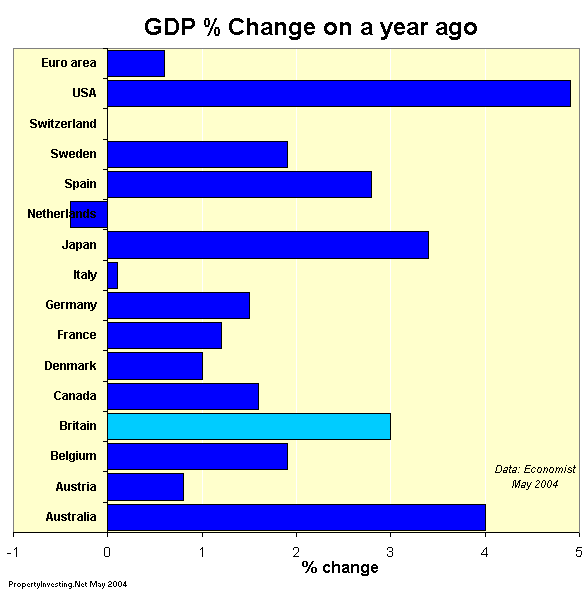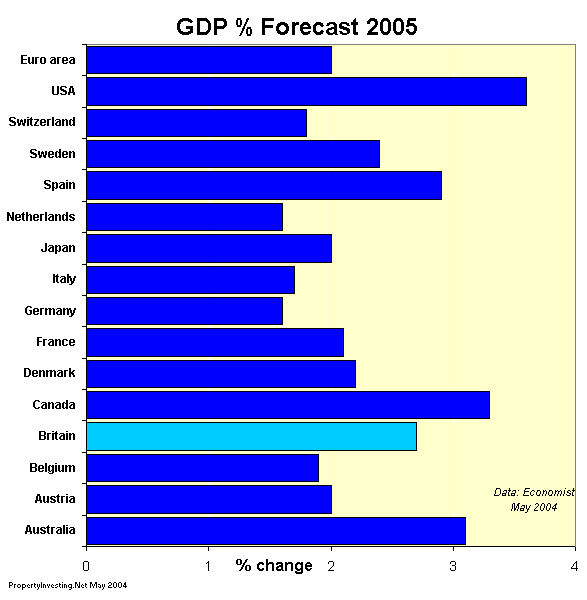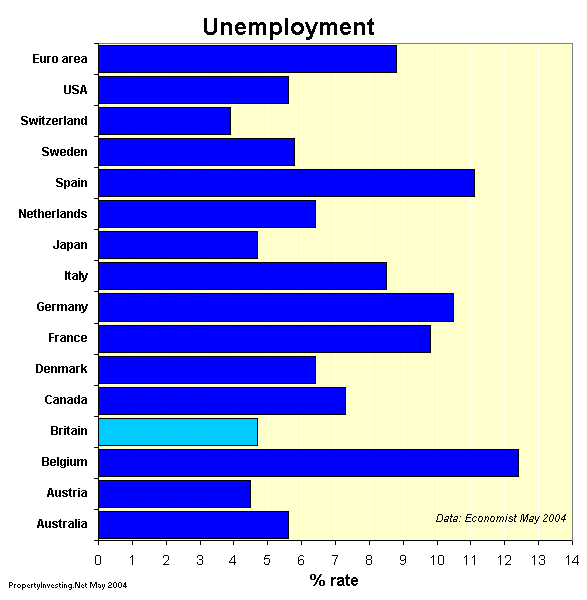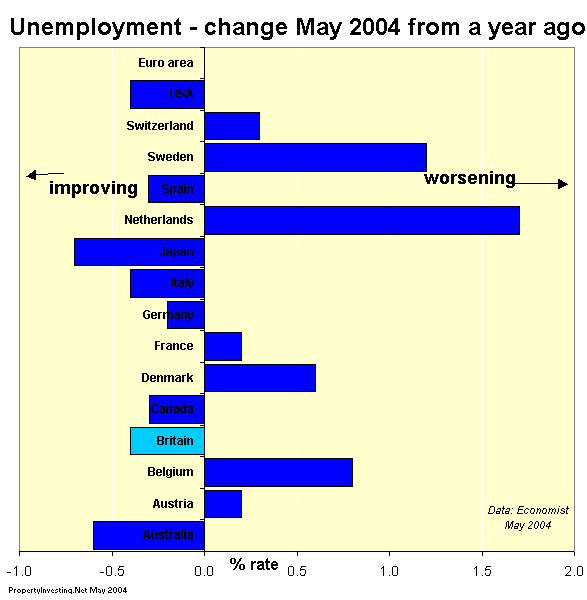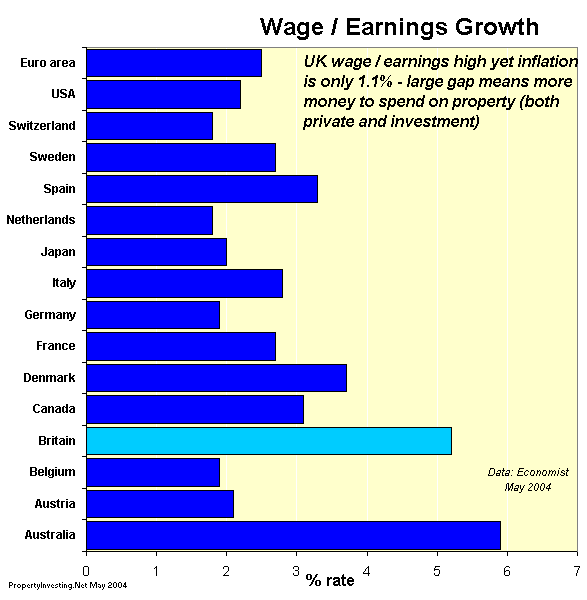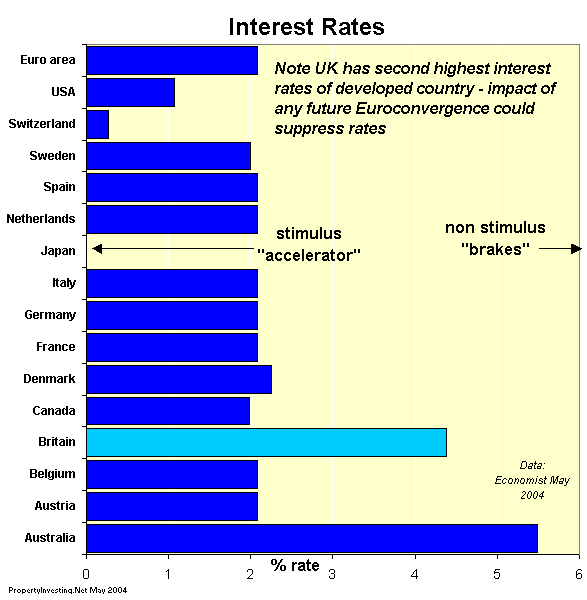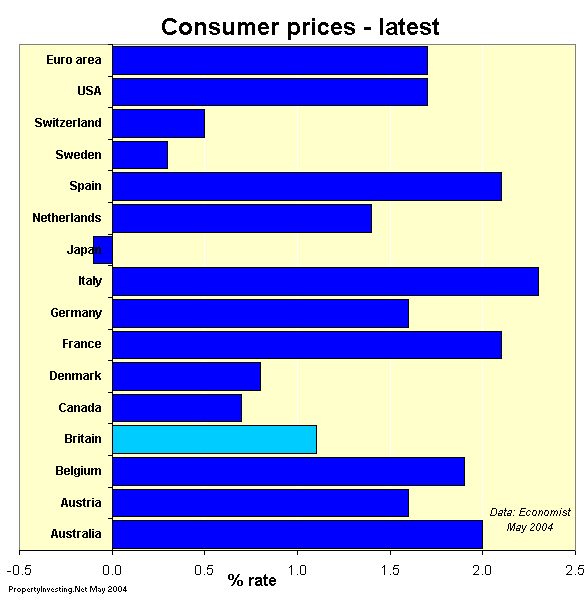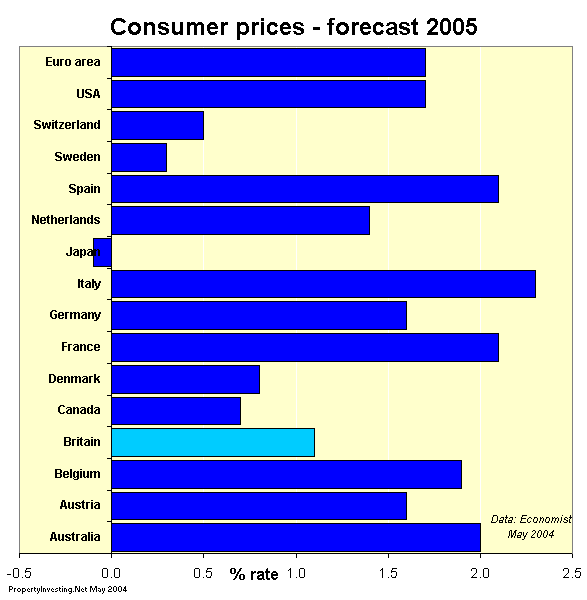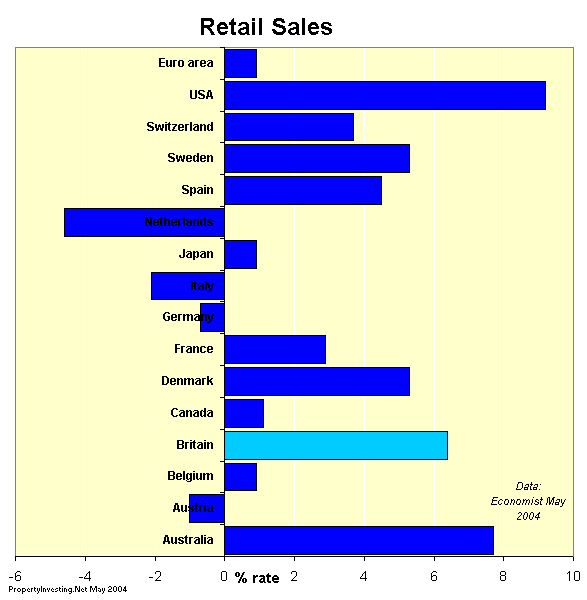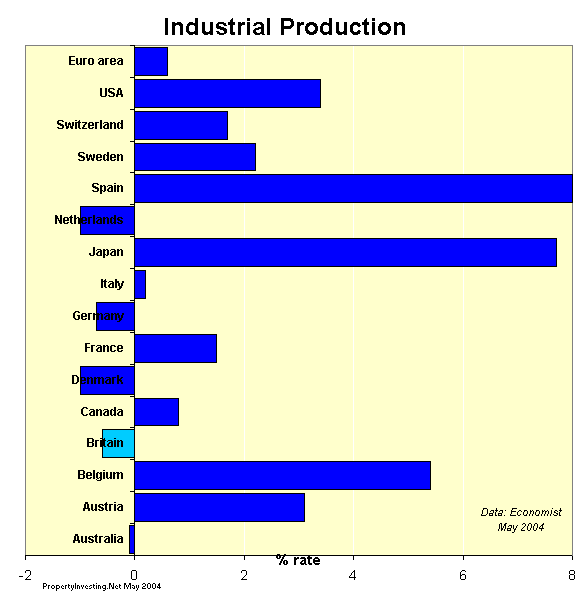2: Economic Outlook for UK Property
05-20-2004
PropertyInvesting.Net Team
PropertyInvesting.Net has analysed the latest economic data for May 2004 and has prepared insights with particular focus on the UK compared with most other large developed countries. The results of the presentation are shown below.
Economic Perrformance Support Prices: The latest growth rate for the UK is about 3%, with a consensus forecast of some 2.8%, the upper end of it’s peer group range. Of particular note in relation to property prices is unemployment rates, that have come down further, with strong wage/earnings growth at 5.2%. In normal circumstances, this would lead to a considerable rise in inflation. However, for the time being at least, CPI inflation runs at 1.1% with forecast for 2005 at 1.8% (just below the target level of 2%). Interest rates are 4% - relatively high compared to UK’s peer group. Indeed, the delat between inflation and interest rates is 2.9% - a high margin indicating the Bank of England applying considerable “brakes” on the economy. In the longer term, although rates are forecast to rise to above 5% by early 2005 and may be a little higher by the end of 2005, there is a possibility rates could come back down in the medium to long term if the UK is to begin to Euro-converge with the European Central Bank rates – currently at 2%. This is indeed more likely if mainland European growth rates remain subdues at say 2%, and rates rise to something like 3%. The 2½ -3% delta between ECB and BoE rates seems high and one would expect it to narrow in the longer term – “daring to mention it” - these could lead to further support for UK house prices after 2005. Retail sales in the UK are strong at 6.3% though this is hardly surprising in view of the GDP growth (3%), lowering unemployment (4.7%) and relatively low cost borrowing costs compared to historic rates (4.25%). This is underpinned by the strong wage/earnings growth (5.2%).
Inflation – what might help mitigate the risk? One fundamental question is whether inflation will start biting in aggressively over the next year – something one would normally expect with such healthy economic conditions. PropertyInvesting.Net believes inflation will rise, but not as high or aggressively at one would normally expect because of a combination of the following:
- Globalisation – the intense competition amongst countries to provide the best quality service at lowest costs, assisted by internet business (transparency of costs, retailing, low prices financial transactions)
- Workers becoming more productive and working harder because of the threat of unemployment – a work ethos that was bourn out of changes in working practices in the 1980s
- UK is a net oil exporter and it’s reliance on oil production is less than in the last oil price shock of 1980 – in real terms, the oil price is still less than 50% of the levels reached in 1980 with its economic impact less than this.
- The Bank of England can react to new data and set rates consistent with the UKs economic outlook, unlike many of it’s EU peers – note the ECB sets rates centrally using a “one-size-fit’s-all” model.
- UK manufacturing is still in the doldrums and manufacturing producer prices have not been rising.
- De-regulation leading to increasing competition – an example is financing costs, housing transactions.
Inflation – what are the main risks?: Some of the risks for inflation are related to higher oil/gas and utilities, higher taxes to help pay for the UK social spending and deficit, and consumers not being prudent with expenditure leading to higher inflation. The so called “consumer boom” has been rather over-played – in a healthy economy, one would expect consumer spending to rise more or less in line with wage/earnings growth – this is what is happening in the UK. Indeed, many retailers are struggling – envisage this to continue as competition intensifies and internet retailing becomes more popular.
Why area some EU countries like the UK performing well against their peers? Consistent with socio-economic trends mentioned on this website, PropertInvesting.Net uses a model which shows that the further from “central Euroland” one gets, the higher the growth rate and more favourable the economic climate for supporting property price growth. Examples are that Ireland, Spain and Norway’s economies and property price growth have been doing well, whilst those in Germany, Switzerland, Austria and northern Italy have been doing poorly. There are many forces acting within this model, but some relate to:
- Population growth
- Flexible workforce
- Competitive environment
- Bureaucratic hurdles
- Interest rates that match economic reality
- Exposure to an aging population
- Inward migration providing low cost labour, filling skills shortages
- Low taxes
- Skilled workforce that embraces change
- Specific countries economic development and potential
On the above criteria, UK and Ireland score quite high (as does the USA) and hence this helps support growth in GDP, wages and property prices whilst suppressing inflation.
What is the outlook for the UK? If government’s policies continue and taxes do not rise appreciably, then PropertyInvesting.Net believe conditions would be favourable to prevent house price declines and support continued price growth – one would hope this was in the single digits moving forwards rather than a booming 15-20% followed by a period of stagnation (or even collapse). As long as mortgages continue to be affordable and wage earnings rises allow spendable income to be directed to service mortgage debit, then stagnation seems unlikely. An optimistic scenario for property investors with large portfolios is that people’s number one aspiration becomes owning property (they covet property) rather than “flashy” cars and other material possessions – thence more of their spendable income is directed to pay for property and this becomes a longer term and sustainable trend leading to higher Price/Earnings ratios? As long as taxes to do rise significantly, this trend could progress as the baby-boomer begin to retire and have their mind on living in a nice home in a nice area as their top priority. Economic fundamentals would trend away from this scenario, suggesting a model where the UK experiences sustained high prices only as long as interest rates stay low (say below 5.25%), unemployment stays low (say below 5%), inflation stays low (below say 2.25%), wage earnings growth is in the healthy 3-5% range with taxes not increasing significantly.
PropertyInvesting.Net - May 2004
